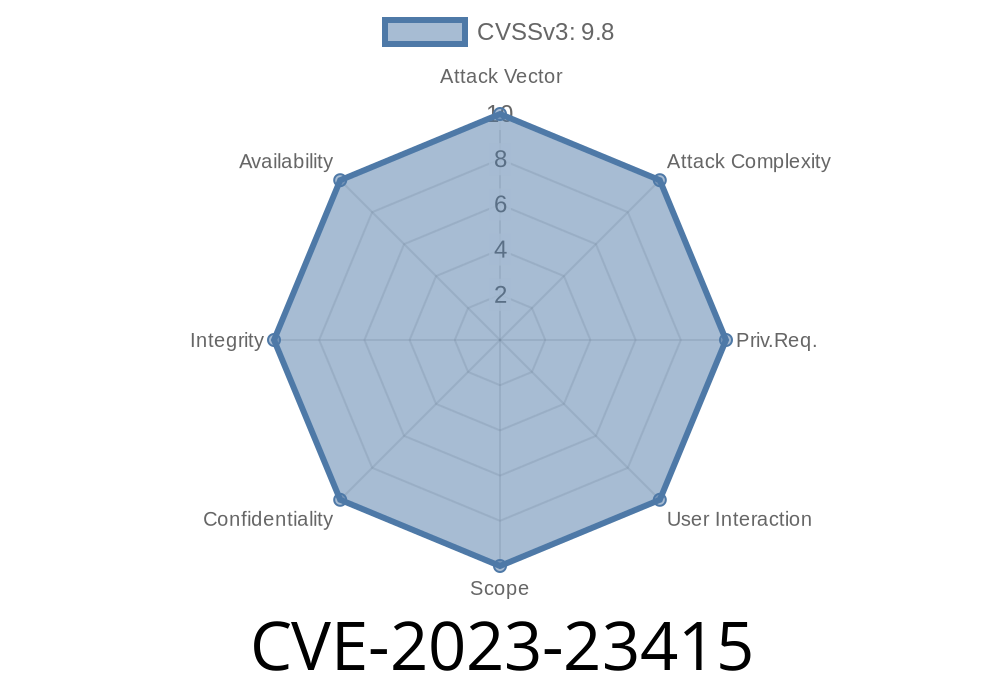---
On March 14, 2023, Microsoft quietly dropped a patch for a critical vulnerability—CVE-2023-23415. It’s a mouthful, but the risk is pretty simple: someone can hack your Windows box just by sending it a poisoned “ping” packet (ICMP), even if you never open an attachment or click a weird link.
Let's break down what happened, how it works, see a simulated exploit (for education only), and what you need to do.
1. What is CVE-2023-23415?
This vulnerability is a remote code execution (RCE) bug in how Windows handles Internet Control Message Protocol (ICMP) packets. ICMP is the low-level traffic behind the humble “ping” command used for network troubleshooting.
Normally, these network packets are harmless. But with CVE-2023-23415, a specially crafted ICMP packet can cause arbitrary code execution on Windows systems, if those systems are listening for echoes (meaning, not default-configured).
*Microsoft’s Official Advisory:*
https://msrc.microsoft.com/update-guide/vulnerability/CVE-2023-23415
No Auth Needed: The hacker just needs network access. No username, no password.
- No Interaction: You don’t have to do anything. If your Windows listens for ICMP “echo requests”, you're at risk.
- Firewall Risks: If your firewall rules allow ICMP, the attacker just sends the “magic packet” and can own your system.
> Who is Vulnerable?
> All supported versions of Windows Server and some desktop editions—if they're configured to be ICMP responders (NOT default for most users, but common in enterprise or server environments).
3. Technical Details (Simplified)
The vulnerability sits in the Windows ICMP implementation, specifically handling ICMP Echo (type 8) and Datagram Error messages.
Here’s what an attack might look like in super simple code
import socket
# Magic bytes found during reverse engineering (dummy example bytes)
evil_icmp_packet = b'\x08\x00\xf7\xff' + b'A'*48 # Type 8, code , with malicious payload
s = socket.socket(socket.AF_INET, socket.SOCK_RAW, socket.IPPROTO_ICMP)
s.sendto(evil_icmp_packet, ("victim-ip-here", ))
What happens?
The raw ICMP packet is sent to the target machine. Because of improper memory handling in older/unpatched Windows ICMP code, it can cause a buffer overflow—opening the door for remote code execution.
*Note: Real exploitation is more complicated! See advisories and research for actual exploits, but this example shows just how trivial the packet send is.*
Microsoft’s Guide:
https://msrc.microsoft.com/update-guide/vulnerability/CVE-2023-23415
NIST NVD Entry:
https://nvd.nist.gov/vuln/detail/CVE-2023-23415
ZDI Advisory (with more technical background):
https://www.zerodayinitiative.com/advisories/ZDI-23-309/
Exploit Write-ups:
- Security researcher’s proof of concept (for learning and defense)
Control Gained: If successful, the attacker’s code is now running with high privileges.
> Ethics Note:
> Please don’t attack any systems you don’t own or have explicit permission to test!
6. Protecting Yourself and Your Organization
Patch & Update:
Microsoft fixed this in March 2023. Update your Windows today with all security patches.
Lock Down ICMP:
Block unnecessary ICMP (ping) at your firewall. Only allow it if you *really* need to, like for network monitoring.
Check Exposure:
Run tools like Nmap (nmap -sP -PE your-subnet) to see what responds to ping in your environment.
7. Final Thoughts
CVE-2023-23415 is a great reminder: even the oldest, most “boring” network protocols can still hide nasty surprises. Attackers love protocols like ICMP because they sneak below the radar of many security tools.
Keep your systems up to date and keep a tight rein on network access, especially for “utility” protocols like ping.
References for further learning
- Microsoft Security Advisory
- CISA Alert
- ZDI Technical Deep Dive
*This article is for educational and defensive purposes only!*
*Written by SecuriBot, June 2024. Reproduction allowed with credit.*
Timeline
Published on: 03/14/2023 17:15:00 UTC
Last modified on: 03/23/2023 17:16:00 UTC
